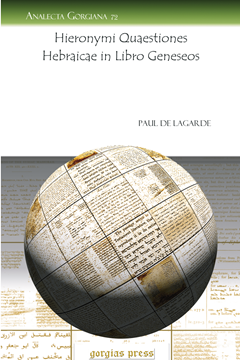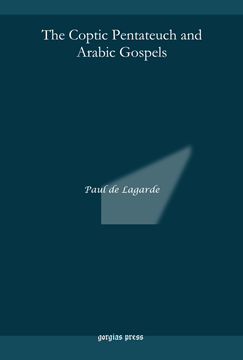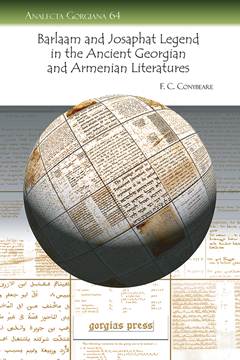Hieronymi Quaestiones Hebraicae in Libro Geneseos
Series: Analecta Gorgiana 72
ISBN: 978-1-59333-964-7
Written in the scholarly Latin of his day, Lagarde considers in this brief study the questions Jerome raises on the Hebrew of the book of Genesis. In an abridged commentary form, Lagarde follows the questions in the order in which the book of Genesis presents the material. Beginning with the creation, Lagarde skips along to the phrases of Jerome’s text that raise questions and provides his insights about them. Presuming that the reader of the Vulgate will understand the Latin of the original, the comments on the material are likewise written in Latin.
$48.00 (USD) $28.80 (USD)
The Coptic Pentateuch and Arabic Gospels
ISBN: 978-1-59333-965-4
Written in the days when textual criticism was still relatively new, and the great mass of manuscripts commonly used by present-day biblical scholars had not yet been plumbed, Lagarde spent many years making these exotic manuscripts available to scholars who previously had no access to them. In this volume are combined two manuscripts: the Pentateuch translated into Coptic, and the Gospels translated into Arabic. Despite the relatively recent dates of the manuscript sources for both collections, the material contained in these translations dates back to earlier days. Each of these translations is introduced in German with some critical notes about the readings included.
$260.00 (USD) $156.00 (USD)
The Early Syriac Lectionary
Series: Analecta Gorgiana 62
ISBN: 978-1-59333-878-7
This piece provides an introduction, translation and commentary to a previously unstudied lectionary text, which provides deeper insight into early liturgical practice and the conception of the canon; and includes an index of the lessons according to books of Scripture.
$41.00 (USD) $24.60 (USD)
Megillat Taanit as a Source for Jewish Chronology and History in the Hellenistic and Roman Periods
Series: Analecta Gorgiana 63
ISBN: 978-1-59333-879-4
Zeitlin’s masterful work supplies the Megillat Taanit’s text and a translation as well as a deft reading of this source’s utility for the history of the Jews from the Maccabees to the Great Revolt.
$59.00 (USD) $35.40 (USD)
The Barlaam and Josaphat Legend in the Ancient Georgian and Armenian Literatures
Series: Analecta Gorgiana 64
ISBN: 978-1-59333-880-0
This work focuses on the literary and textual concerns of the Georgian and Armenian recensions of the Barlaam and Josaphat legend, and provides translations of all that remains of the Georgian text and the relevant Armenian parallels.
$41.00 (USD) $24.60 (USD)
Zoroastrianism
A Concise Introduction
By George Moore
Series: Analecta Gorgiana 65
ISBN: 978-1-59333-881-7
This work is an excellent, concise history of the development of the Zoroastrian religion. Special attention is given to the historical development of the religion from monotheism to a dualistic system, with particular emphasis on ethical and eschatological teachings.
$42.00 (USD) $25.20 (USD)





